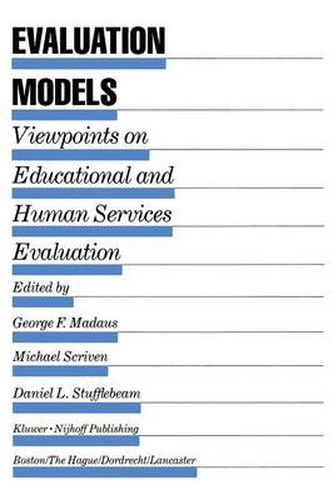Readings Newsletter
Become a Readings Member to make your shopping experience even easier.
Sign in or sign up for free!
You’re not far away from qualifying for FREE standard shipping within Australia
You’ve qualified for FREE standard shipping within Australia
The cart is loading…






This title is printed to order. This book may have been self-published. If so, we cannot guarantee the quality of the content. In the main most books will have gone through the editing process however some may not. We therefore suggest that you be aware of this before ordering this book. If in doubt check either the author or publisher’s details as we are unable to accept any returns unless they are faulty. Please contact us if you have any questions.
Attempting fonnally to evaluate something involves the evaluator coming to grips with a number of abstract concepts such as value, merit, worth, growth, criteria, standards, objectives, needs, nonns, client, audience, validity, reliability, objectivity, practical significance, accountability, improvement, process, pro duct, fonnative, summative, costs, impact, infonnation, credibility, and - of course - with the tenn evaluation itself. To communicate with colleagues and clients, evaluators need to clarify what they mean when they use such tenns to denote important concepts central to their work. Moreover, evaluators need to integrate these concepts and their meanings into a coherent framework that guides all aspects of their work. If evaluation is to lay claim to the mantle of a profession, then these conceptualizations of evaluation must lead to the conduct of defensible evaluations. The conceptualization of evaluation can never be a one-time activity nor can any conceptualization be static. Conceptualizations that guide evaluation work must keep pace with the growth of theory and practice in the field. Further, the design and conduct of any particular study involves a good deal of localized conceptualization.
$9.00 standard shipping within Australia
FREE standard shipping within Australia for orders over $100.00
Express & International shipping calculated at checkout
This title is printed to order. This book may have been self-published. If so, we cannot guarantee the quality of the content. In the main most books will have gone through the editing process however some may not. We therefore suggest that you be aware of this before ordering this book. If in doubt check either the author or publisher’s details as we are unable to accept any returns unless they are faulty. Please contact us if you have any questions.
Attempting fonnally to evaluate something involves the evaluator coming to grips with a number of abstract concepts such as value, merit, worth, growth, criteria, standards, objectives, needs, nonns, client, audience, validity, reliability, objectivity, practical significance, accountability, improvement, process, pro duct, fonnative, summative, costs, impact, infonnation, credibility, and - of course - with the tenn evaluation itself. To communicate with colleagues and clients, evaluators need to clarify what they mean when they use such tenns to denote important concepts central to their work. Moreover, evaluators need to integrate these concepts and their meanings into a coherent framework that guides all aspects of their work. If evaluation is to lay claim to the mantle of a profession, then these conceptualizations of evaluation must lead to the conduct of defensible evaluations. The conceptualization of evaluation can never be a one-time activity nor can any conceptualization be static. Conceptualizations that guide evaluation work must keep pace with the growth of theory and practice in the field. Further, the design and conduct of any particular study involves a good deal of localized conceptualization.